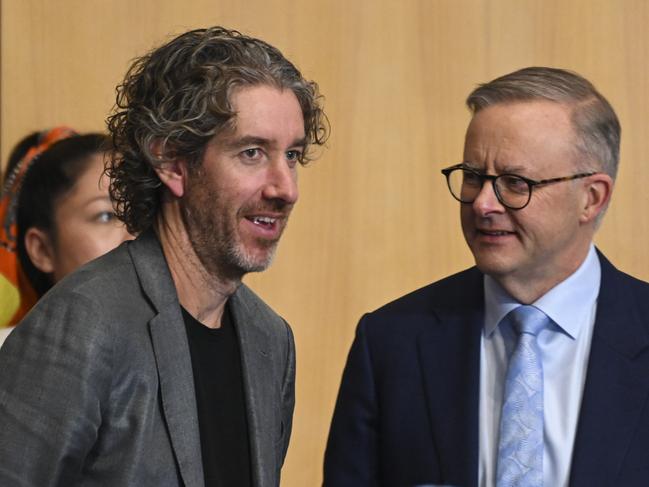Atlassian shares fall as losses widen
The Sydney software company, led by billionaires Scott Farquhar and Mike Cannon-Brookes, beat analyst expectations but losses have swelled.

Shares in Australian software darling Atlassian fell by more than 10 per cent in after-hours trading on Friday with the company, led by billionaires Scott Farquhar and Mike Cannon-Brookes, reporting a widening second-quarter loss.
Australia’s largest tech outfit told shareholders that while it continues to rapidly grow headcount – while its competitors are shedding staff – and lift spend on research and development, its customers are upgrading from free plans to paid plans at a slower rate due to the market downturn.
Investors punished the stock after hours and Atlassian, listed on the Nasdaq, fell 12.75 per cent to $US159.15, wiping more than $US1bn each from the paper wealth of both Mr Cannon-Brookes and Mr Farquhar, who each own about 20 per cent of the company.
The company is now down 40 per cent in the last 12 months amid a sharp tech downturn.
Atlassian posted revenue of $US872.7m ($1.232bn) for the second quarter of the 2023 financial year, up 27 per cent from a year earlier and beating a consensus analyst revenue estimate of $US842.5m.
Its operating losses widened however, on the back of the personnel expansion, with the company reporting an operating loss of $US99.2m for the quarter, compared to operating income of $US23m a year earlier.
Its net loss swelled to $US205m, compared with a net loss of $US22.3m 12 months ago.
Its co-CEOs said that they’re focused on “playing the long game while being incredibly capital efficient.”
“That’s a winning strategy and we’re sticking with it, co-CEOs Mike Cannon-Brookes and Scott Farquhar said in a letter to shareholders.

“Despite the current macroeconomic headwinds, the massive opportunities in front of us have not changed, and we’re ready to execute with relentless focus throughout 2023.
“Continuing the trend from last quarter, existing customers are expanding their paid seats at a slower pace. We also continue to see solid growth in free editions of our cloud products, but more hesitancy to upgrade to paid editions.
“While these two macro-induced headwinds became more pronounced in Q2, calendar year 2023 will be all about helping our customers navigate these challenging times, absorbing the downstream impacts on our business, and setting ourselves up for long-term success.”
The pair also deployed their typical Australian colloquialism, which they regularly turn to in shareholder communications.
“We’ve positioned ourselves for success in a challenging environment, and we’re ready to get after it. (As we say in Australia, ‘we’re not here to #@!% spiders.’)”
Atlassian ended the 2022 calendar year with 253,177 active customers, up 4,004 net new customers for the quarter.
Founded in Sydney 20 years ago, Atlassian develops collaboration software products for software developers, project managers and other software development teams. Its flagship products include Jira, Confluence and Bitbucket.
Mr Cannon-Brookes and Mr Farquhar, each stalwarts of The List: Australia’s Richest 250, have held on to 353,174 shares each in the company, equating to around 20 per cent of the business each.
Atlassian is one of the few large tech companies to avoid making lay-offs, with its latest filings showing global staff numbers have grown rapidly in the past three years to 10,787. The company has a ‘Team Anywhere’ policy, in which its employees can work remotely from any country in which it has a physical office.
For fiscal Q3, the company expects revenue of between $US890m to $US910m, its co-founders said, slightly below analysts’ forecasts.
“We closed out 2022 with quarterly revenue of $US873m, up 27 per cent year-over-year, driven by subscription revenue growth of 40 per cent year-over-year,” co-CEO Scott Farquhar said in a shareholder letter.
“We are proud of everything we have accomplished in yet another unpredictable year. 2023 will be all about helping our customers navigate these challenging times, absorbing the macro-driven impacts on our business, and setting Atlassian up for long-term success.”
Co-CEO Mike Cannon-Brookes said, “Our track record of making smart investment decisions in the service of long-term pay-offs continues to yield results as we recently surpassed 45,000 Jira Service Management customers, making it one of our fastest-growing products.
“We’ll keep playing offence across our three large markets while being pragmatic.”
Markets analyst Megan Stals of trading platform Stake said that after an underwhelming 2022, Atlassian stock had surged by more than 44 per cent in 2023, but this had primarily been driven by signs of cooling inflation rather than company fundamentals.
“For Atlassian investors, today’s results will be disappointing, and could suggest the recent tech rebound was premature,” she said.
“Atlassian beat earnings per share estimates, but the rate of customer growth continues to decline and the company is struggling to convert free users into paying customers. Given the recent tech industry lay-offs, it is not surprising that its JIRA product, which primarily helps tech teams to collaborate, has struggled.
“Enterprise software revenues are usually more robust during economic downturns, but for unprofitable companies that rely on continuous growth this is often not enough. In a negative nearterm signal for enterprise tech, Amazon’s cloud arm, AWS, also missed estimates last quarter. Growth in the cloud segment has slowed across the industry and Atlassian again lowered expectations for 2023.”



To join the conversation, please log in. Don't have an account? Register
Join the conversation, you are commenting as Logout